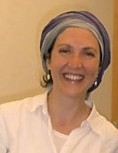
For 10 evenings we left our children home with spouses, parents, friends, and baby-sitters and enjoyed a full hour-and-a-half in adult conversation. This magical opportunity enabled us to unpack and debate traditional and modern texts, and share relevant stories from our own experiences. We always circled back to how the texts and our discussions could inform our parenting. We talked about raising our children to be proud Jews while appreciating beautiful Christmas lights; we discussed ways of teaching our children about death, tzedaka, prayer, and mitzvot, and how to appreciate the qualities that make our children special (even if these same qualities sometimes drive us crazy). But what felt most valuable was the opportunity to engage in Jewish learning at a serious adult level.
On an airplane, they always tell adults to first put on their own oxygen masks before helping a child. I think the same applies to our families’ Jewish lives. We’re always thinking about our children’s education, both Jewish and secular, and what kid-appropriate activities we can do to help mold their character. But even more important than what we tell them is what we show them. When our children see us encountering serious Jewish learning, celebrating Jewish holidays, and figuring out what our Jewish identities mean to us on an adult level, they learn that these aren’t just kids’ activities and issues, but important things to attend to for our entire lives. Though we spent time in class focusing on how to guide our children, I think the time we spent studying “Torah for its own sake” will prove at least as important to our children’s development.
It was a great honor and privilege for Rabbi Liben and myself to accompany these incredible 18 women and men, representing 13 families, on this stage of their Jewish journeys. May we, and all the PTJL class of 2011-2012, go from strength to strength. I can’t wait to see where the next stage of our journey will take us.
Cantor Ken Richmond is the cantor and family educator of Temple Israel of Natick, a klezmer musician and Yiddishist. He has taught in Parenting Through a Jewish Lens for the past two years.




